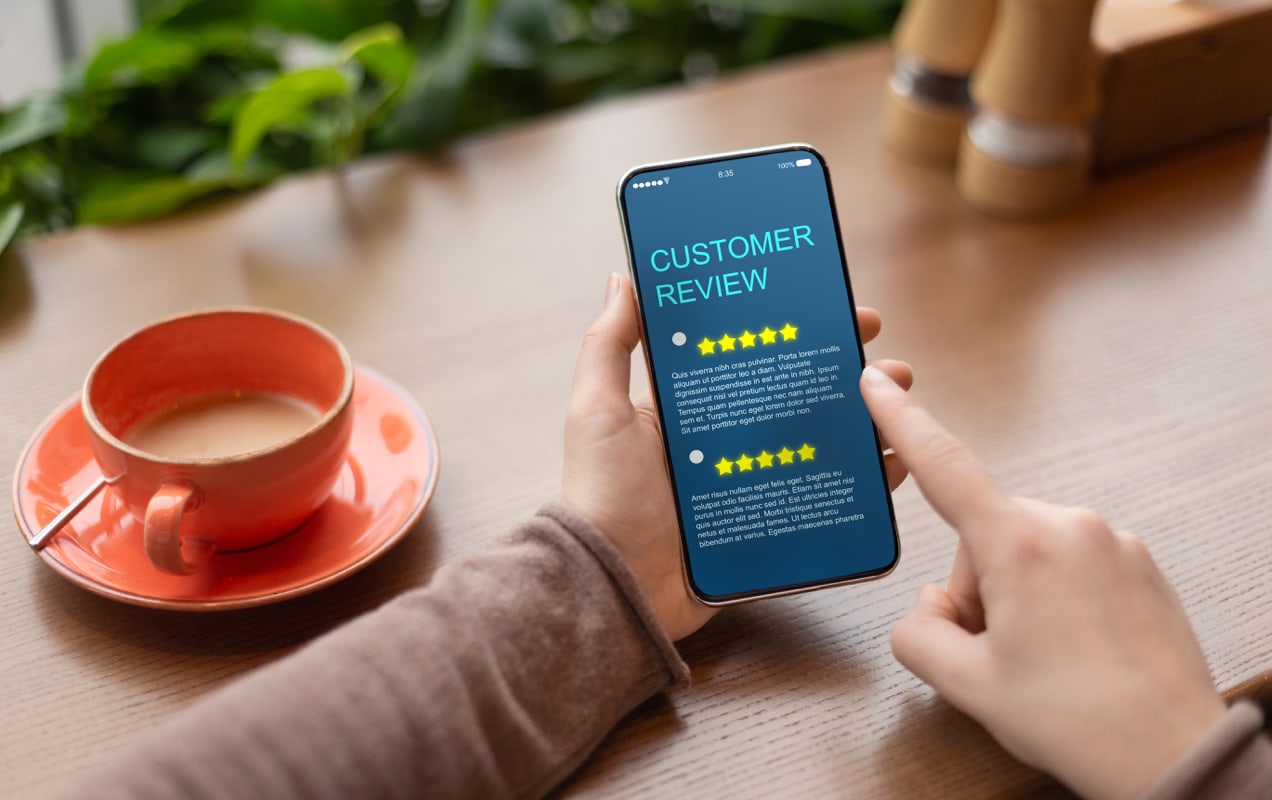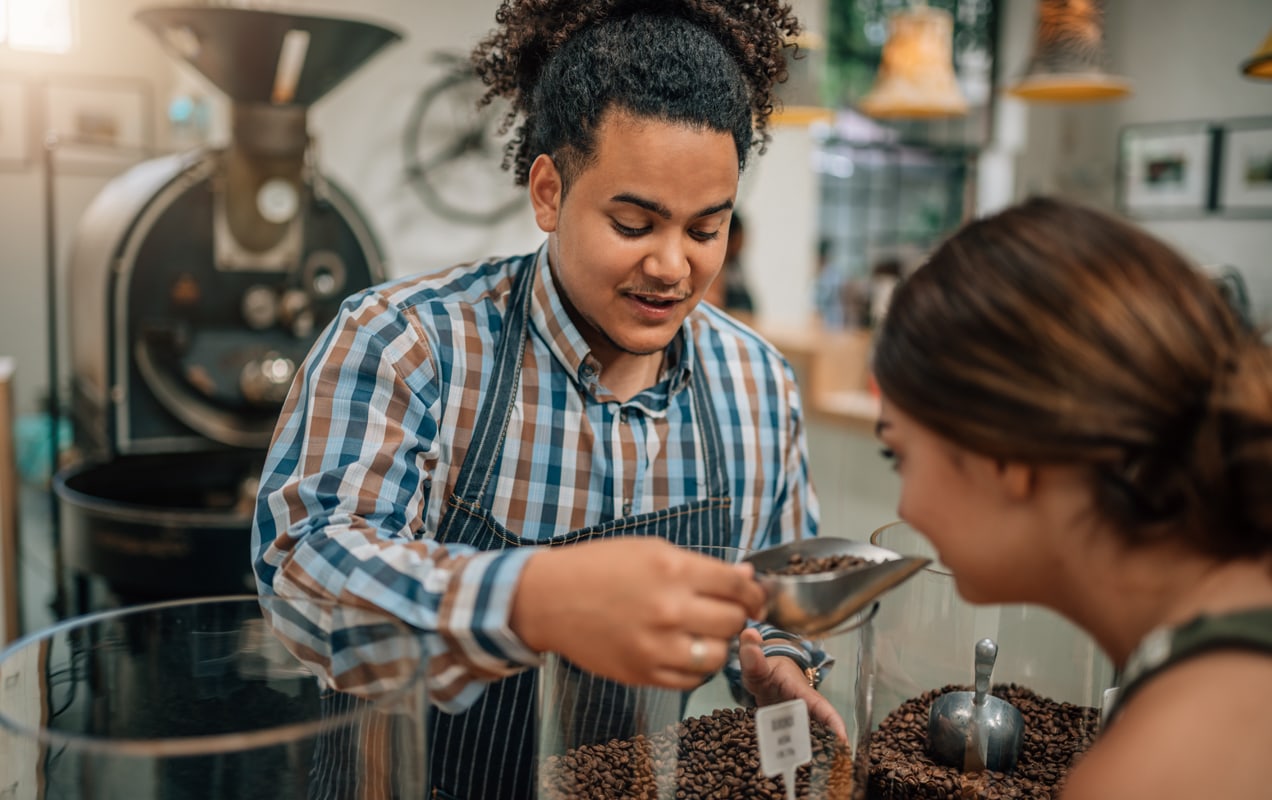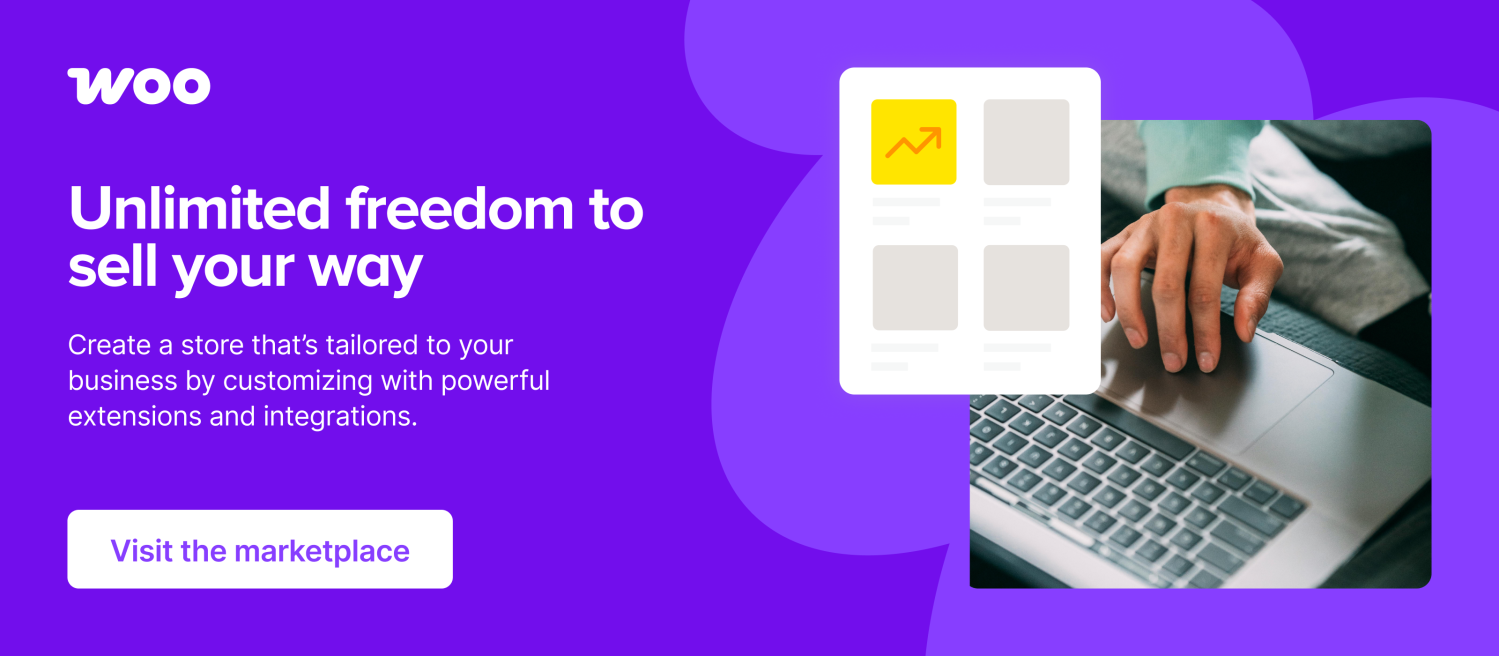Search engine optimization (SEO) is an incredibly valuable marketing method. Though it’s a long-term strategy, when properly done, it can generate site traffic that’s actively searching for what you have to offer — all without any paid advertising!
If you have a physical location or sell only to a specific area, local SEO is a strategy to help you reach members of your most relevant, nearby audience. But what is local SEO and how can you optimize your ecommerce store?
What is local SEO and why is it important?
↑ Back to topWhen you’re at home and search a phrase like “mechanic” on Google, you’ll get a list of nearby auto shops. But let’s say you’re traveling and get a flat tire. If you search the exact same phrase a hundred miles away from home, you’ll get an entirely different list based on your location. That’s local SEO at work.
When you optimize your site for local SEO, you’re optimizing for a very specific area. And while this certainly makes sense for a retail store that wants to attract foot traffic, it also makes sense for a meal prep company that delivers within a 20-miles radius or an online store that sells merchandise for people who live in Dallas.
A good local SEO strategy helps you hyper-focus on your specific target audience rather than people all around the country or the world. And this ultimately means that more qualified customers will discover your site and make a purchase.
Let’s take a look at how you can optimize your site for local SEO, along with helpful steps you can take off-site.
Start with SEO basics
↑ Back to topWhen someone searches for something online, Google’s goal is to provide them with the most accurate results and the best experience possible. So to rank well, you need to prove two things to search engines:
- Your site has meaningful, valuable content around certain topics or keywords.
- Your site provides an excellent experience for its visitors.
There are a number of basic SEO optimization practices that help you do this, including:
- Consistent, high-quality content marketing like blog posts.
- A responsive website design that allows readers to access your content across mobile devices.
- An easy-to-navigate store.
- A site that loads quickly.
- High-quality links to your store from trusted sources.
- A secure website that also has an SSL certificate.
Make sure you have these nailed down before focusing on local SEO. For more information, check out Jetpack’s post about SEO for beginners and our advanced guide to product SEO.
Optimize for your area
↑ Back to topOnce you have the basics in place, it’s time to move on to local SEO. There are a variety of steps you can take to focus on your immediate area, but below you’ll find some of the most common and effective.
1. Claim your Google My Business listing
Google My Business is a free tool that helps local businesses manage their company’s listing on Google. That listing is what shows up on Google Search and Google Maps, with your business name, location, hours, reviews, website, and additional information.
Create an account and enter as much information as possible about your store. Add photos, respond to reviews, and always make sure that everything’s accurate on your listing, including hours.
This guide from Search Engine Journal provides everything you need for claiming and verifying your listing, along with tips for managing it.
2. Claim your listing in other major directories
It used to be beneficial to list your business in every single directory you could find. But Google’s algorithm has changed to focus more on other ranking factors. However, that’s not to say that you shouldn’t add your company to a few, meaningful directories that apply to your industry — these still carry some weight and are often a symbol of trust to potential customers.
Here are just a few of the business directories you might consider. Choose the ones you focus on based on your audience, products, and industry:
- Bing Places
- Yelp
- TripAdvisor
- Apple Maps
- HomeAdvisor
- WeddingWire
- Angie’s List
It’s important that the information you set for your business is accurate across every single listing. This includes your name, hours, location, website, etc. And, if anything changes, make sure to update it everywhere.
Sound overwhelming? You can also hire services like Moz Local to handle it all for you.
3. Adjust your target keywords
Keywords are the phrases that you want your business to show up for when searched by potential customers in your area. Right now, you might be targeting more generic terms like “craft beer,” “vintage books,” or “family-friendly resort.” But to focus those keywords on your local area, you’d use terms like “craft brewery in Louisville,” “vintage books for sale in St. Paul,” or “best family-friendly resort in Smith County.”
How do you know the right keywords for your business? You want to find a balance between phrases that people are actually searching and ones that you have a chance of ranking for. Here are a few ways you can do this:
- Use Google Keyword Planner. With this free tool, you can type in a starting phrase, find related keywords, and see information like search volume.
- Type phrases into Google. Try just typing a phrase into Google and letting autocomplete do its job. For example, if you type in “Davidson coffee,” it will automatically suggest similar terms like “Davidson coffee shop,” “downtown Davidson coffee,” and “vegan coffee shop in Davidson.”
- Use tools like SEMRush and Moz Keyword Explorer. These tools provide extensive information about exactly what your target audience is searching online.
Once you’ve determined the right keywords, incorporate them naturally onto your website. Instead of stuffing them in everywhere you possibly can, use them in phrases that make sense, the way you would if talking to a friend or colleague.
While you probably don’t want to change your entire SEO strategy to accommodate these new keywords, adding them to page titles, meta descriptions, and content written specifically for your area is a great way to incorporate them.
Want more tips? Check out this resource from Search Engine Journal.

4. Write content specific to your area
You may already regularly create high-quality content like blog posts, videos, eBooks, etc. If so, you’re off to a great start! Content is one of the most effective ways to show Google (and potential customers) that you’re an expert on certain topics.
As you focus on local SEO, however, you also want to shift the topics you write about. What questions do customers have that are specific to your area? For example, if you sell gardening products, you could write about plants that are specific to your region, along with harvest times. If you sell custom dog collars, you might share a guide with the best dog parks in your city.
Remember those local keywords we talked about earlier? Now is the time to incorporate them, naturally, into your blog posts.
If one of your target keywords is “cooking classes in San Francisco,” you might write a blog post with the best things to do in the city. Then, make one of the headlines something like, “Take a Cooking Class in San Francisco,” and write about your offerings.

5. Focus on reviews
Search engines love reviews because they’re an excellent indication of your business and product quality. And, of course, they’re beneficial even beyond local SEO because potential customers look at reviews when deciding on a place to shop or eat.
But how should you go about getting reviews? First of all, never pay for reviews. Not only will search engines easily figure out your strategy, you’ll lose customer trust.
The best way to earn reviews online is to simply ask for them. Post a sign in your storefront, include an insert in your product packaging, or add a review request to your transactional emails.
Focus first on getting reviews on Google, then spread out to the other local directories you signed up for, like Yelp or TripAdvisor. Respond to as many reviews as possible, be professional and kind to any unhappy customers, and adjust your business practices as needed.
6. Generate local links
When a trusted source links to your website, it’s essentially vetting your business to Google. Quality backlinks are a good strategy for SEO in general, and this remains true for local SEO. The difference is that instead of looking for link opportunities from generic websites, you’re looking for websites that are authorities in your specific area. You can generate links to your website by:
- Writing a guest post for a local blogger.
- Participating in local events.
- Being featured in city or county directories.
- Sponsoring a local charity.
- Earning a feature in a local newspaper or magazine story.
A simple Google search will help you find authoritative websites in your area. If you decide to reach out to influencers or other businesses, do so in a way that’s beneficial to them. For example, offer to write a guide to your city or a blog post that speaks to their target audience rather than just expecting them to do you a favor.
7. Add structured data to your site
Structured data is a type of markup used by search engines to understand information. It’s a great way for you to explicitly provide details about your website to Google, increasing the chance that you’re featured in special search results like carousels and answer boxes.
For example, if you’re a local restaurant that posts online recipes, you could use structured data to tell Google information like cook time, calorie count, and reader reviews. When someone finds that recipe on a search engine, the result will include all of that information and look much “richer” than normal — this is called a rich snippet. Not only does this help search engines know how to categorize your content, it also makes your recipe stand out more to searchers, increasing the likelihood that they’ll click.
There are a lot of types of structured data, including:
- Books, with information like author, quotes, and purchase links.
- Events, with information like date, time, and location.
- Local business, with information like hours, ratings, directions, and links.
- Products, with information like price, availability, and reviews.
- Q&A, with questions followed by their answers.
Focus on the ones that specifically apply to your business.
While adding structured data to your site can be complicated and may require a developer, you can also use a plugin to make this process much easier. Options include Yoast SEO (try their local SEO add-on for an extra boost), Schema Pro, and All in One Schema Rich Snippets.
Read this guide from Yoast for more information.

How to handle multiple locations
↑ Back to topBut what if you have multiple locations and just one website? Here are a few tips for handling local SEO:
- Build separate landing pages. Instead of including information for every store in one place, be specific! Create a page for each location with details like contact info, reviews, hours, news, images, and blog posts that are specific to that store. Apply local business structured data to each page.
- Create separate Google My Business listings. Claim your listing for each location and make sure the data is up-to-date. The same thing goes for other directories.
- Write specific blog posts. Create content around each of your locations. These posts may include customer stories, employee features, hyper-local news, or topics that specifically apply to that area.
- Focus on building links to each location page. When generating backlinks, link to specific location landing pages, when appropriate. This is especially relevant for news features or events around a specific store.
- Encourage reviews for each location. Follow the steps above for gaining reviews, but make sure that you’re doing so for each individual location that you have.
Get started with local SEO for long-term success
↑ Back to topIt’s important to remember that local SEO is a long-term marketing strategy. It will take time for your website to climb the rankings, but steady, consistent work will pay off. It’s more than worth it for the increase in free, qualified traffic to your online store.
About



Excellent, I launched an educational site with your service
Excellent, Hossdin! Glad you found WooCommerce a great platform to build with.
Very useful SEO tips.
Great! Thanks for reading!
Really informative and helpful tips! These tips have been of great benefit. I would like to get something more modern from this site. Thanks For Sharing and Keep Up the Good Work.
Glad you found it helpful, Lance!
It was helpful when you explained that SEO helps to promote brand authority for our business.
Thanks for helping me see why SEO would help us accomplish that goal!
Thanks James! Glad you found it helpful!
Local SEO has much importance now and COVID-19 changes the Local SEO totally now people preferred to order online every product.
Great point, Saima. COVID-19 has definitely affected online stores and local SEO can help people find nearby businesses that offer curbside pickup, delivery, etc.
What If the competition is too much high. Then Should I have to go for that niche or just make A strong impact on that particular Niche, Like CAB niches that have high searches but Google suggest only 6 Website. should I go with that or not?
Hi Ayesha!
If you have a lot of heavy competition, you should do two things:
1) Yes, definitely choose a narrow niche market to focus on first. This article is mostly for online stores, but has a lot of great information on identifying a niche: https://woocommerce.com/posts/how-to-choose-a-niche-online-business/
2) Make a long-term plan for reaching a broader, more competitive market. Understand that this will take a lot of work and a much longer period of time to see results. But following SEO best practices consistently, and over a long enough period of time, will eventually pay off!
Thanks for the point on setting up structured data! Regarding the point of writing content for your specific area, how many different content pieces would we need to write for targeting a keyword? I’m sure there isn’t a number, but wanted to hear your thoughts on how to approach this or think about it.
Hi Brian! Good question.
Ideally, you’d have a static page or cornerstone blog post as the main target for a shorter-tail version of your term. You’d then look to write multiple posts including variations and/or longer-tail versions of your keyword that all link back to that static page/cornerstone post. 😎 As you mentioned, there’s no hard and fast number of posts – let’s say “several”.
Hope this helps!
Yes, reviews are the most prominent part of local SEO, In local SEO voice search optimization also a great strategy.
You’re right, Dipanshu, reviews are definitely an important component of local SEO. Great point about voice optimization as well — you can check out this article for more info: https://woocommerce.com/posts/voice-search-optimization
Tendência
No Pong: From startup to multinational business with WooCommerce
By Vanessa Petersen •
Use print-on-demand to scale your business without inventory risk
By Latoya Duffus •
How buy now, pay later options can help your business grow
By Vanessa Petersen •
Never miss a beat — join our mailing list
Please enter a valid email.
View our privacy policy. You can unsubscribe anytime.
There was an error subscribing; please try again later.
Thanks for subscribing!
Emails will be sent to
You're already subscribed!
Emails are sent to